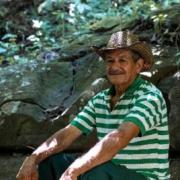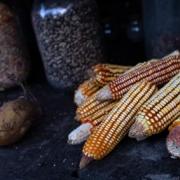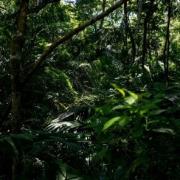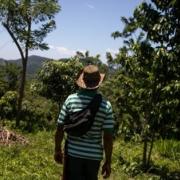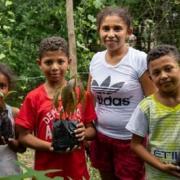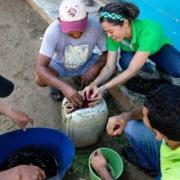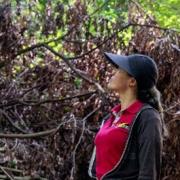“We call this place Eden,” says Eduardo Rodríguez, gesturing to the location he has suggested for our interview.
It isn’t hard to see why. A small stream winds its way through lush tropical foliage and smooth boulders; long vines hang from the canopy and dip into the crystal-clear pool created where the stream cascades in a small waterfall. Every now and again, a brightly colored butterfly flutters past. Up near Rodríguez’s house, the temperature is pushing 38° C (100°F) but here, the air is fresh and cool.
Rodríguez views his farmland in the community of Vereda Brasilar, in the Montes de María region near Colombia's Caribbean coast, as a paradise today, but that hasn’t always been the case. When he arrived over 30 years ago, he, like many farmers in the area, cleared the land, then primarily planted money-making avocado trees.
His farm withstood the years of conflict that fractured his family and community in the early 2000s. But then a plague hit his avocado trees in 2008, followed by a devastating drought. The death of the trees left the soil exposed to the hot Caribbean sun, which, combined with the drought, killed whatever crops remained.
Rodríguez knew it was time to start doing things differently. “We saw a great necessity to protect the environment because we were in a very difficult situation,” he remembered. “We couldn’t find water, we couldn’t find animals, there were no birds.”
Extreme heat and unpredictable rains
In this area of Colombia, climate change is an undeniable reality. MCC staff experienced it firsthand during our visit in July of 2023. Temperatures climbed above 30° C (90° F) by midmorning, making field visits any later than 10:30 a.m. almost impossible, and causing our camera to overheat and shut down in the middle of interviews.
Heat isn’t the only effect of climate change in the region.
Rains have now become unpredictable. Farmers used to expect light rains to arrive in the spring, a signal that it was time to plant.
However, in July 2023, rain had yet to fall. The prior year, by contrast, unexpectedly heavy rains caused a creek in the nearby communities of Pichilín and La Florida to overflow, catching residents, unaccustomed to flooding, unawares.
Unpredictable weather means plants no longer produce the way they did in the past.
“Before, when we planted a soursop tree, we used to get tired harvesting all the fruit,” says Rodríguez. “But now, with these changes, a big tree that used to produce a lot of fruit hardly produces anything.”
Climate change and conflict
These changes to the climate not only threaten individual livelihoods, but the ripple effects can cause a fracturing of communities. When a major drought or flood knocks out a crop for the entire year, farmers may look elsewhere for money, including to illegal mining operations or armed groups.
This area of Colombia, like many others, has experienced decades of armed conflict, and the continued presence of these groups threatens the fragile peace that MCC partner Sembrandopaz and people like Rodríguez have worked so hard to build.
Sitting by the side of the stream, Rodríguez remembers life during the height of the armed conflict in the region in the early 2000s.
The conflict was highly complex, involving the Colombian military, paramilitary groups, and leftist guerilla groups. Entire communities were identified as being supporters of one group or another and threatened, displaced or massacred by that group’s enemies.
During these years, collective action and community organizing was seen as a threat, and perceived as supporting the guerilla groups.
Rodríguez had been a community organizer; after he was falsely accused by a government informant of aiding the guerrillas, he was held prisoner in Cartagena, a coastal city nearly four hours away, for six months.
While he was in prison, he worried about his crops, his livelihood. In a different incident, Rodríguez and many neighbors were displaced to San Jacinto, the nearest town, because of threats from armed groups. The armed groups were patrolling the highways, and farmers transporting food were sometimes intercepted by the military.
“They said we were going to bring food to the guerillas, and of course that wasn’t the case, we were just trying to bring it to our families.”
But eventually they returned because, far from their crops and without income, it had become hard to access enough food. “That [displacement] caused my family to suffer from hunger, but thanks to God we live in a place that produces everything. We can grow everything we need,” he says.
While the conflict in this area of Colombia is no longer as intense as it was in the early 2000s, armed groups are still present, and traumatic experiences of massacres and displacement linger in the memories of its residents. Some communities have remained fragmented, their social fabric frayed by mistrust.
While climate change didn’t create the conflict, the more a community suffers the impacts of climate change, the more people are left without enough income to support their families. That makes it more likely for people to turn to things like illegal mining or other activities connected with the armed groups, continuing to fuel future violence and displacement.
Healing the land and working for peace
Rodríguez is part of a farmers’ association that, after the 2008 avocado tree blight, started seeking assistance from agricultural organizations in the area. The search eventually led them to MCC partner Sembrandopaz (short for Sembrando Semillas de Paz, Sowing Seeds of Peace). With Sembrandopaz’s support, Rodríguez and the other farmers have learned practices to support reforestation and sustainable agriculture that help build resilience to climate change. These strategies also help build peace, because in this region, climate resilience and peace are closely intertwined.
For example, in what Sembrandopaz refers to as “economies of good living,” staff work with farmers like Rodríguez to promote farming techniques like agroforestry and companion planting. This helps ensure a steady supply of diverse food available on farmers’ own land, despite the increasingly extreme and unpredictable weather. Being able to rely on staple crops at home means less need to travel elsewhere to purchase food. This becomes especially important if travel is limited by insecurity.
Sembrandopaz also has an experimental farm where staff save native seeds that are resilient to heat and drought, and experiment with new agricultural techniques for new climate realities.
Today, rather than land full of only avocado trees, Rodríguez’s farm is diverse and full of a variety of trees. His fields are full of staple crops like yam and yuca that grow interspersed with mango, guava and other fruit trees.
Other activities, like reforestation and tree-planting days, build community as they increase resilience to climate change. Reinforcing the interpersonal connections of people in these communities has been one of Sembrandopaz’s core approaches to peacebuilding and trauma healing since the events of the early 2000s. Coming together to plant trees fosters a sense of community care and requires communal decision making.
Sembrandopaz and community members also teach environmental care to the next generation, so that communities can continue to thrive long into the future. There is hope that children who learn to live in peace with their surroundings — humans, plants and animals — will be less likely to join armed groups or get involved in criminal activities as they grow up.
“If we don’t do anything to change the situation [climate change], the next generations won’t have a place to live out their rights,” says agricultural engineer Etel Salas, part of the economies for good living team. “You can’t have peace where there’s hunger.”
Rodríguez agrees. “We’re trying to do good through conservation of the environment,” he says. “Everything we can to create peace.”
In Colombia, and around the world, MCC partners are helping communities adapt to climate change. But they can only do so much on their own. They need more support for their adaptation work, and most of all they need to halt the progression of climate change, and for countries with higher emissions to take actions. You can support Rodriguez and communities like his by voicing your concerns to your government representatives about climate change and its impacts. Raising your voice to bring attention to the impacts of climate change is one way you can help create a more peaceful future for communities in Colombia and beyond. You can sign one of these advocacy letters today, or learn more about other ways to get involved here.


